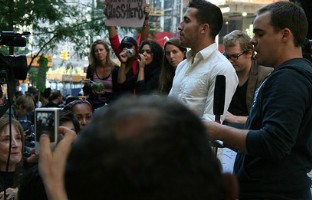Powerful occupation

The Occupy Wall Street movement has grown immensely since demonstrations began in September. Media coverage has exploded as well, much of it emphasizing the movement's lack of focus. The protesters champion the cause of the nation's poorest 99 percent, whose well-being has been neglected in favor of the wealthy few. But what specific remedies do they propose?
It's hard to build and sustain a popular movement around a specific policy demand. Although the Tea Party movement, for example, was sparked by a single demand—don't let the government bail out homeowners facing foreclosure—this was soon eclipsed by a cacophony of activism. That in turn gave way to a political constituency centered not on an isolated policy position but on a slogan-ready principle: government should be smaller. Rick Santelli's rant on the floor of the Chicago Board of Trade didn't achieve its immediate goal—the homeowner bailout program went into effect—but it did galvanize a broader movement.
Occupy Wall Street began with a single demand as well. Adbusters magazine proposed demonstrations that would call for "a presidential commission tasked with ending the influence money has over our representatives in Washington." The contrast in venue—a nonprofit magazine versus the largest derivatives exchange in the world—is telling. While the Tea Party includes some grassroots elements, it has often served the interests of the powerful. But Occupy Wall Street is governed via direct democracy, with decisions reached through consensus. Thus it is even less geared for message discipline than the nascent Tea Party was.




